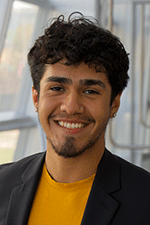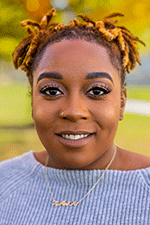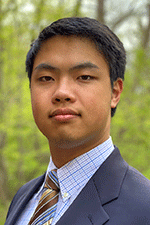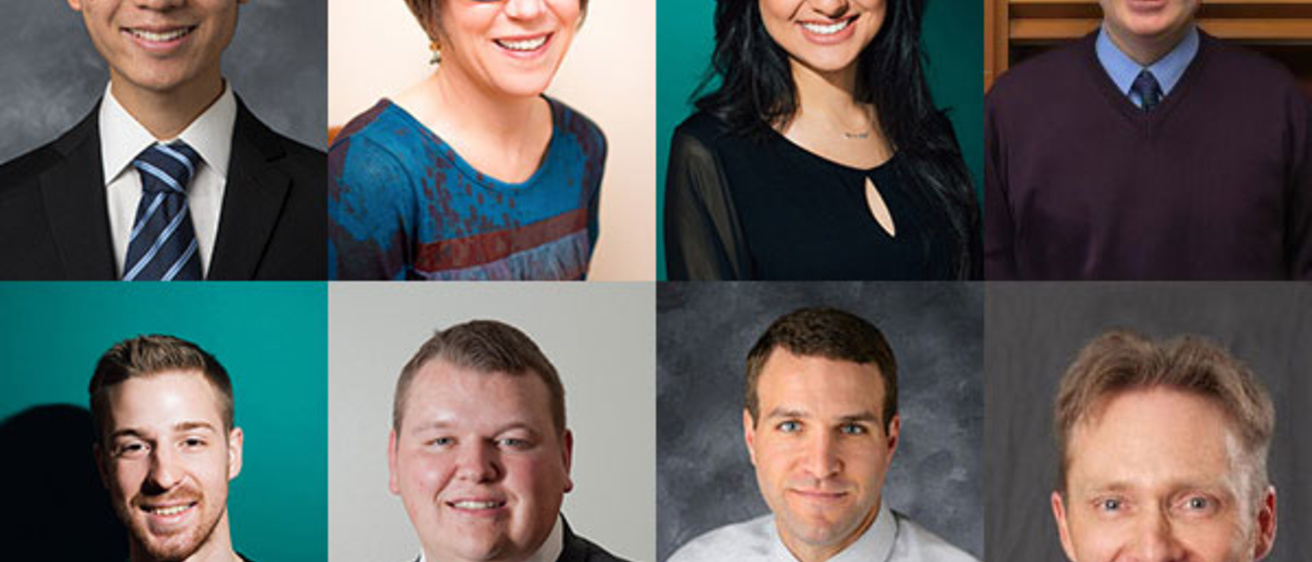University of Iowa shared governance bodies elect new leadership each spring semester. Together, Faculty Senate, Staff Council, Undergraduate Student Government (USG), and Graduate and Professional Student Government (GPSG) shape policies and inform decisions that affect Iowa’s students, faculty, and staff. They represent their constituents to the UI administration; the Board of Regents, State of Iowa; the public; and the state and federal government.
Read about the skills and experience these leaders bring to their positions and what they aim to accomplish this year.
Faculty Senate
Teresa Marshall, president of Faculty Senate, is the Michael W. Finkelstein Centennial Professor of Teaching and director of the Student Research Program in the College of Dentistry and Dental Clinics.
Ana Rodríguez-Rodríguez, vice president of Faculty Senate, is the director of graduate studies and associate professor of Spanish and Portuguese in the College of Liberal Arts and Sciences (CLAS).
Learn more about Faculty Senate.
What experiences inform your role as a shared governance leader?

Marshall: Prior to being a Faculty Senate officer, I served on multiple shared governance committees and was a member of both senate and council. In my current role, my responsibilities have allowed me to work with multiple departments over many years. I’ve had to learn about and appreciate multiple departments’ strengths and challenges as well as negotiate strategies to achieve shared educational visions.

Rodríguez-Rodríguez: I am starting my 14th year at the University of Iowa, during which I have been a faculty member in the Department of Spanish and Portuguese. Last year, I was interim departmental executive officer of the Department of French and Italian. I was a member of a number of CLAS shared- governance committees, and chair of CLAS Faculty Assembly in 2016/17. I was elected to be a member of Faculty Senate from 2011 to 2014 and again from 2019 to 2022. I am also currently a member of Faculty Council until 2022, and I was Faculty Senate secretary last year. These experiences have deepened my understanding of the issues faced by faculty—including those on the tenure, clinical, research, and lecturer tracks—from the different colleges within the university. My perspective continues to broaden and my appreciation for our community continues to deepen as I speak to faculty in all disciplines about their accomplishments, challenges, and needs.
What are important issues facing your constituents, and how do you plan to address them?
Marshall: Currently, our faculty are concerned with the COVID-19-related health and safety of themselves, their families, their students, and the greater Iowa City community. Public health recommendations (i.e., vaccinations, mask use) to reduce COVID-19 risk have been politicized, resulting in the spread of preventable disease throughout the country—we would like to avoid a COVID-19-related public health crisis among the university and greater Iowa City community.
Faculty Senate officers have been in regular communication with the Office of the President to share faculty concerns and advocate for the implementation of preventive measures, while appreciating that Iowa law is in conflict with public health recommendations, preventing the president from acting on mandates.
Recent national and local challenges to academic freedom and free speech, including the passing of Iowa’s free speech bill, have resulted in discussion about how to teach sensitive content required by accrediting bodies and necessary for students to achieve success in their chosen disciplines.
Rodríguez-Rodríguez: Nobody could have foreseen the magnitude of the health and social crisis we find ourselves in due to the COVID-19 pandemic. This issue will be a priority in the coming months, if not years, since the consequences of the current situation are still unforeseeable. I am convinced that this moment will allow for a paradigm shift in a variety of ways and put us in a position to reflect on the role faculty have in creating a future in higher education that we may not be able to fully envision. I am a big believer in the power of a humanistic approach to reality, with dialogue and conversation working as consensus-builders, even when it seems almost impossible to come to agreements and work as a team. Dialogue, flexibility, collaboration, transparency, and lots of forward-looking thinking will be essential as we navigate the months and years ahead of us. Faculty Senate will work to respond to these challenges with professionalism and fairness toward all members of the university while defending the indispensable role of shared governance at the University of Iowa.
What can we expect from Faculty Senate in the coming months?
Marshall: Unfortunately, we expect ongoing dialogue regarding COVID-19 to ensure the health and safety of our community, and we will continue to advocate for the safety of our faculty.
Rodríguez-Rodríguez: We will continue our conversations with administrators, faculty, and shared governance groups to continuously advocate for a safe campus in the midst of the COVID-19 pandemic, while simultaneously addressing other relevant current issues such as academic freedom and free speech.
Staff Council
Kevin Zihlman, president of Staff Council, is assistant athletics director of compliance in the Department of Intercollegiate Athletics.
Jackie Kleppe, vice president of Staff Council, is director of the outreach and engagement division of Marketing and Communications for University of Iowa Health Care.
Learn more about Staff Council.
What experiences inform your role as a shared governance leader?

Zihlman: I have worked in higher education at three different institutions over the last 16 years. In those roles, I’ve met hundreds of staff members through cross-departmental collaborations. Over the years, despite the various roles that we have in higher education, the staff experience has some very common threads. I reflect on my past and current work relationships to help form my leadership and communication styles in my daily work, which in turn directly impact my role as a shared governance leader.

Kleppe: In August I celebrated 22 years of employment with the University of Iowa, having spent eight of those years on the academic side doing outreach with undergraduate admissions and the past 14 years on the health care side in marketing and communications. During those 22 years, I’ve been involved in many campuswide committees; witnessed a lot of changes across campus both in health care and academics; and had the pleasure of meeting multiple UI presidents, working with many people across many departments, and being elected to Staff Council four years ago. It is the long history and understanding of the UI and UI Health Care; strong relationships and communication with faculty, staff, and students across campus; and my unwavering commitment and dedication to the UI in wanting what’s best for our institution and our people that drives my enthusiasm in being a shared governance leader.
What are important issues facing your constituents, and how do you plan to address them?
Zihlman: Staff have been impacted in a multitude of ways over the past year and a half. Many staff continually express concerns and opinions about our Future of Work initiatives for the fall semester. Staff care deeply about the university’s policies and protocols relative to public health measures surrounding COVID-19. Staff Council will continue to be a conduit for staff to have their voices heard by UI leadership. Concurrently, Staff Council will also serve to make sure its constituents are getting the most up-to-date, accurate information from UI leadership. We will encourage UI leadership to be transparent in explaining their rationale behind decisions that impact the UI staff experience.
Kleppe: The impact of COVID-19 affected staff in many ways and continues to pose many challenges for staff. From remote-work challenges and opportunities to safety and well-being concerns, UI staff continue to voice concerns, opinions, and ideas, and I will strive to listen to and share those concerns, opinions, and ideas with leadership.
What can we expect from staff council in the coming months?
Zihlman: Staff Council is making it a point this year to highlight the amazing work of various staff that happens outside of their day-to-day jobs. We need to be celebrating, and frankly bragging about, the great work UI staff members do that impacts the Iowa City area, Johnson County, the state of Iowa and beyond. Those stories should be taken to UI leadership so they can be sharing out with our donors and state legislators about how the UI impacts our society. Staff Council is about making substantive collaborative efforts with our other shared governance partners. The campus community should be on the lookout for future endeavors brought forth by the shared governance partners.
Kleppe: UI staff continue to go above and beyond, not only within the scope of their work with the UI but in the community and across the state. Our shared governance leadership team finds it important to showcase the outstanding efforts and impact the members of our staff have on our community, region, and state. We hope to highlight some of this meaningful and impactful work. The impact the UI makes on the state of Iowa is significant and important to be shared and showcased.
As a health care employee, I also hope to continue the efforts to better inform and engage health care staff with important UI information and build awareness of Staff Council efforts and initiatives among UI Health Care employees through various communication channels while also giving opportunities for health care staff to share feedback, concerns, and ideas to support shared governance.
Undergraduate Student Government
Regan Smock, USG president, is a senior from Coggon, Iowa, studying sociology and Spanish.
José Muñiz Jr., USG vice president, is a senior from Muscatine, Iowa, studying social justice.
What experiences inform your role as a shared governance leader?

Smock: I have spent the last two years serving as the director of academic affairs in Undergraduate Student Government. During that time, I was able to work to make the college experience more affordable for students; make navigating a university more accessible to all students, including first-generation college students; and work to make academic life equitable for all of our students. COVID-19 and learning online last year took a toll on our students, but through this pandemic I was able to see in a new way the need for equity work in everything that we do. All of my advocacy over the last year transformed me into a stronger and more thoughtful leader.

Muñiz: During my time at Iowa, I’ve served in a number of different roles that have helped shape my experiences and perspectives when it comes to supporting students. During my time as a center programming assistant at the Latino Native American Cultural Center, as a resident assistant, and as the Latino/x Men and Masculinities student lead, I’ve been able to see firsthand the different experiences that students from different backgrounds go through on campus. In these roles, I’ve been able to help support and give a voice to communities that seemed to go unheard. This has helped my leadership skills and to always bring in different perspectives that usually aren’t brought to these tables.
What are important issues facing your constituents, and how do you plan to address them?
Smock: We are planning to focus strongly on mental health this year. It is not difficult to see the ways that the pandemic and its consequences touched the lives of students on our campus. This year we are aiming to build a structure to provide increased and improved mental health resources to Black, Indigenous, and People of Color and underserved students, add language around mental health to academic absence policies, and advocate for funding for more support systems for students at the state level.
Muñiz: Mental health has always been something that many students struggle with. Coming back from a virtual transition to in-person is going to be a large shift as well. We want to make sure that students are getting the grace that they need when going through the school year because while we are back in-person, this semester is anything but “normal.”
What can we expect from USG in the coming months?
Smock: We will be holding events to get to know students and for students to know our role on campus. We also will be having more guests on our podcast, USG for U, to help students navigate campus and get connected with resources. We also just finished our platform for the year, and senators will begin working on projects that will make our campus a better place.
Muñiz: In the coming months, I want to emphasize the events that USG is putting together to connect with students on campus and creating relationships—helping students navigate campus this year since we know that this year’s seniors are the only ones that have really had a full year on this campus—and some important projects that are underway.
Graduate and Professional Student Government
Moala Bannavti, president of GPSG, is a fourth-year doctoral candidate from Nso, Cameroon, studying civil and environmental engineering.
Walt Wang, vice president of GPSG, is a fourth-year PharmD/MPH student from Davenport, Iowa.
What experiences inform your role as a shared governance leader?

Bannavti: My experiences in shared governance the past two years most influence my role as a shared governance leader today. Prior to becoming GPSG president, I was on both the executive and the legislative part of the organization. That taught me how to use broader stakeholder concerns to encourage the decisions we make within shared governance. We must always keep in the front of our minds that we are nothing more than representatives for our constituents. What graduate and professional students want is what I as GPSG president want.

Wang: My primary experience with shared governance is the teamwork and collaboration between each shared governance group as we work together on issues that impact all of us. As someone who attended undergrad at Iowa and now a graduate and professional program, I have found that the continued lessons we get from working with our peers are invaluable, and I look forward to having this great year to use those experiences. Last year, I served as the Graduate and Professional Allocations (GPAC) Committee chair for GPSG. As GPAC chair, I found that communication and transparency is essential in shared governance. I hope to leverage that experience in forming cross-campus partnerships as we work together.
What are the important issues facing your constituents, and how do you plan to address them?
Bannavti: The issues that we could address on behalf of graduate and professional students are endless. Some solutions that we are trying to tackle immediately are expanding the city of Iowa City’s Workforce Housing program, raising suicide-prevention awareness with training programs, making Juneteenth a holiday on our academic calendar, and having paid parental leave for all students with university employment.
Wang: The largest issue facing my constituents is the current pandemic. In particular, the financial and health implications have been tremendous. I plan to address these issues first by listening to my constituents, then communicating those concerns to the university administration, Board of Regents, and other governing bodies.
What can we expect from GPSG in the coming months?
Bannavti: You can expect the return of fun networking events like Friday Night Vibes, Skate Night, and more. And of course, the continued advocacy for graduate and professional students’ needs in and outside of the University of Iowa.
Wang: Later this month, GPSG is working with USG to host a joint session. It is a very beneficial session that will allow us to maximize transparency in the legislative process. Also, we have been working on updating many things, including the constitution, website, and social media accounts. In addition, we plan to participate in a few other joint activities on campus, so it is likely that many students will see at least a few members of GPSG leading activities around campus. This year, we plan to resume a more hybrid approach to allow for maximum participation from our constituents. All of our upcoming meetings are planned to be hybrid, so I highly encourage anyone interested to come and witness our legislative process.
